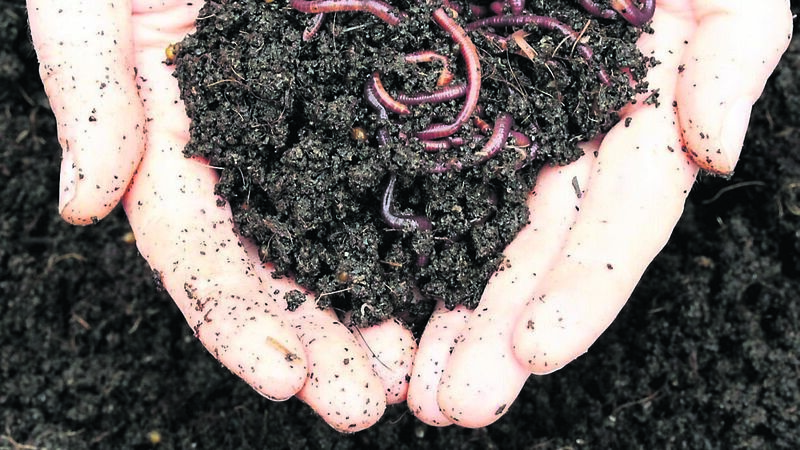Saving the planet? Let’s start by protecting worms and bats

Worms are the unsung heroes of the soil, turning waste and plant debris into valuable, nutrient-rich soil for our plants.
Even then, the main way it was mentioned was in a kind of a negative way because people were bemoaning the decline or lack of biodiversity.
I never really researched the meaning of the term until the last few years when it came into common usage.
Biodiversity loss, climate change and global warming are now topics of everyday conversation. We may choose to ignore them and pretend they are ‘world problems’ and nothing to do with us, but cause and effect, action and result, ‘no man is an island’, or probably the old Irish sean-fhocail sums it up best and brilliantly, ‘Ar scath a cheile a mhaireann na daoine’. Yes, truly we do live in each other’s shadow and harmonious co-existence is vital for all of us.
Yesterday, Wednesday, October 4, was the last day of the Catholic Church’s 2023 Season of Creation which began on September 1. It was the time that the Church asked believers to reflect on the glory of creation, its boundless marvels, but also the real and growing threats to the existence of the world as we know it today.
Trying to keep average temperature rise below 1.5C in a decade and trying to slow down the melting of Polar ice caps seem very laudable aims, though a bit lofty and far removed from our daily lives. They might seem ‘out of our reach’, and planetary problems - none of our business really on a day to day basis.
I always thought that ‘better to light a candle than curse the darkness’ was translated from Old Irish, but it appears I was wrong, very wrong, as the Chinese claim that nugget of wisdom as one of their ancient proverbs.
When we hear about air or water pollution, or toxic waste disposal, we tend to say, ‘Look at China, sure they’re at it all the time and it doesn’t matter what we do here, sure we’re only a drop in the ocean’.
If everyone everywhere took that attitude, the outlook for the world we live in, mankind and civilisation, would be woeful.
Large oaks from little acorns, they say, and we must all do our bit, no matter how small.
Pope Francis is a busy man these days. No sooner has the Season of Creation ended than the Church Synod has commenced this week in Rome. As things stand, the worldwide influence of the Catholic Church isn’t what it once was and, God himself knows, that might be no harm in its own right.
Change comes dropping slow in all walks of life and so it is with the Church also. Go back 20 or 40 years -would religious leaders of any faith be bothered with things like the environment or biodiversity loss?
Not likely, but truly times they are a-changing and the welfare of the body is as important as the future of the immortal soul.
I’m a self-confessed Luddite in terms of technology, and especially social media, but I’ll freely admit all types of modern social media ‘channels’ ensure no-one can plead ‘ignorance’ in terms of what’s happening to our world and its environment.
There’s a line in one of my favourite songs, Silence Is Golden - ‘Talking is cheap, people follow like sheep, even though there is nowhere to go’.
Well, there’s no place to hide now and the day has dawned long ago as regards the way the human race is treating its home.
Apparently, there are still groups of Holocaust deniers active across the world. There are none so blind as those who will not see, and like people who refuse to believe the truth of the 1939-1945 period in our history, those who stoutly defend the theory of ‘Global Warming Problem - What Problem?’ are doing humanity a grave disservice.
If everyone would or could simply believe that each and every one of us has a part- maybe a miniscule part - to play in solving the world’s problems ’twould be a great day’s work entirely!
In the last 12 months, I have been intrigued by two types of creatures -seldom seen or heard but thankfully still abounding around here. I speak of worms and bats.
They seem like insignificant little creatures - not very photogenic and certainly not warm or cuddly in the normal sense of those words!
From a farming point of view, worms are as important as the weather and nutrients in ensuring healthy soils which can produce abundant crops. Worms live in the ground and aerate the soil.
If land is too compacted from heavy machinery or too much livestock, the ability of plants to send down roots to garner nutrients is impaired. The millions of worms in each and every acre of Irish farmland ensure the air gets into the soil and they ‘open up’ the soil to provide vital drainage for rainwater.
Excessive use of slurry and artificial chemical fertilisers can kill off or decimate the underground worm population. If they are gone the soil gets’ heavy’, rainwater can’t soak down, grass won’t grow as well, and in a vicious circle more fertiliser is applied to ‘get the grass growing’ again.
Even having a variety of different types of grasses growing in each field or paddock is so helpful for the birds, bees and butterflies.
In recent decades, the tendency in so-called ‘progressive’ farms is to have just one, maybe two grass species growing. That’s just a simple example of biodiversity and how it can quickly decline.
It was the English writer GK Chesterton who said ‘Don’t ever take a fence down until you know why it was put up’ - wise words, well spoken.
This was a classic case of biodiversity destruction on a grand scale.
Where there are trees and shrubs and flowering plants bees, flies and insects abound. These latter three some form the basic menu for the nine different bat species we have in this country.
Nocturnal mammals, bats probably have got a ‘bad press’ over the years -including the myth that they love to land in heads of curly human hair!
The Irish for a bat is a very descriptive phrase, ‘sciathain leathair’ or leather wings. We did a bat survey here about three years ago. The exercise was repeated a fortnight ago using special ‘sonar type’ bat detectors.
Once more, we were amazed to discover that five of the nine bats native to Ireland live around here. They can eat up to 400 insects each night. The insects tend to feed on leaves of trees and plants - ‘rotha mor an saol’ - the big wheel of life.
In foreign countries, bats pollinate many flowers and fruits - without bats we’d have no bananas, avocados or mangos! I know, I know it’s a fair auld stretch to go from Pope Francis to worms and bats but, like our fields, my imagination is fairly fertile!







 App?
App?




